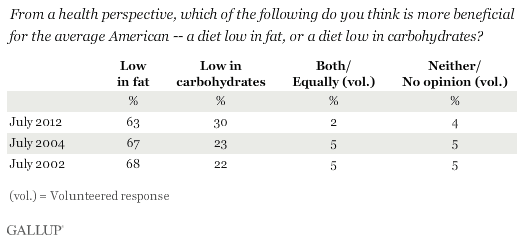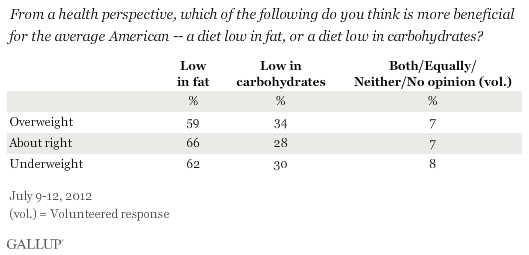PRINCETON, NJ -- Even as recent research has reignited the debate as to which type of diet is best, most Americans (63%) continue to believe a diet low in fat is more beneficial to one's health than a diet low in carbohydrates (30%). But slightly fewer Americans favor a low-fat diet now than in 2002 and 2004, and more prefer a low-carb one.

Despite the traditional medical advice that dieters should reduce foods high in fat, recent research, including a well-publicized study in The Journal of the American Medical Association, has suggested that a low-carb diet boosts overall energy expenditure, meaning that low-carb dieters are burning more calories per day than their low-fat counterparts. Still, many experts are undecided on the question of which diet is most beneficial, reminding dieters that the main focus is not the character and content of the diet, but the reduced amount of calories consumed.
Changes in diet affect overall health and weight. The latter issue will continue to be of consequence to many Americans, given that 41% of national adults consider themselves very or somewhat overweight, and a full 48% admit to worrying about their weight all of the time or some of the time. Beyond these self-reports, Gallup calculations of the Body Mass Index of Americans, based on their height and weight, show that 62.4% of Americans are overweight or obese, including a majority in every state in the country.
Groups More Likely to Prefer Low-Carb Diet
Non-whites are more likely to say the low-carb diet is better for the average American than are whites -- 37% vs. 28%, respectively. Women (36%) also appear to favor this type of diet compared with men (24%).
Young Americans under age 30 are slightly more in favor of the low-fat diet than those who are older.

Overweight Americans' Views on Best Diet Differs Slightly From Overall Average
Americans who say they are overweight are more likely to say a low-carb diet is the healthier option (34%) than are those who consider their weight to be "about right" (28%). Meanwhile, those in the "about right" group are slightly more likely to pick the low-fat diet (66%) than are their overweight counterparts (59%). These slight differences aside, both groups prefer the low-fat diet by significant margins.

Bottom Line
New medical research has provided advocates of a low-carb diet with evidence to support their position, but so far Americans appear to believe that the traditional low-fat diet is more beneficial, albeit by not quite the same margin as eight or 10 years ago. These data suggest that if and when Americans do diet, they will lean toward the low-fat route rather than the low-carb one.
About the Gallup-Healthways Well-Being Index
The Gallup-Healthways Well-Being Index tracks well-being in the U.S., U.K., and Germany and provides best-in-class solutions for a healthier world. To learn more, please visit well-beingindex.com.
Survey Methods
Results for this Gallup poll are based on telephone interviews conducted July 9-12, 2012, with a random sample of 1,014 adults, aged 18 and older, living in all 50 U.S. states and the District of Columbia.
For results based on the total sample of national adults, one can say with 95% confidence that the maximum margin of sampling error is ±4 percentage points.
For results based on the total sample of 520 men, one can say with 95% confidence that the maximum margin of sampling error is ±5 percentage points.
For results based on the total sample of 494 women, one can say with 95% confidence that the maximum margin of sampling error is ±6 percentage points.
Interviews are conducted with respondents on landline telephones and cellular phones, with interviews conducted in Spanish for respondents who are primarily Spanish-speaking. Each sample includes a minimum quota of 400 cell phone respondents and 600 landline respondents per 1,000 national adults, with additional minimum quotas among landline respondents by region. Landline telephone numbers are chosen at random among listed telephone numbers. Cell phone numbers are selected using random-digit-dial methods. Landline respondents are chosen at random within each household on the basis of which member had the most recent birthday.
Samples are weighted by gender, age, race, Hispanic ethnicity, education, region, adults in the household, and phone status (cell phone only/landline only/both, cell phone mostly, and having an unlisted landline number). Demographic weighting targets are based on the March 2011 Current Population Survey figures for the aged 18 and older non-institutionalized population living in U.S. telephone households. All reported margins of sampling error include the computed design effects for weighting and sample design.
In addition to sampling error, question wording and practical difficulties in conducting surveys can introduce error or bias into the findings of public opinion polls.
View methodology, full question results, and trend data.
For more details on Gallup's polling methodology, visit www.gallup.com.
